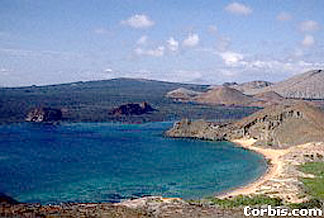
|
|
Pig At Sea?December 11 - New Zealand Photo courtesy 'Native Dancer' |
 |
|
December 11 - Falmouth, England Brit Pete Goss's gallant effort to get the radical and much
troubled Adrian Thompson designed, wave piercing, wishbone- rigged,
maxi catamaran to Monaco for the start of The Race came to an
end on Sunday morning. After rocketing around the winter seas
of the North Atlantic for nearly a week in everything up to 65
knot winds and at up to 35 knots of boat speed, the central pod
was damaged to the extent that the boat could only sail to the
northeast. Here's the story from The Race website: |
|
Environment taken hostage in the Galapagos Islands.December 11 - Galapagos Islands |

|
December 11 - The Pacific Ocean and Cyberspace
Who is out making passages in the Pacific and what kind of weather are they having? Check out YOTREPS - 'yacht reports' - at http://www.bitwrangler.com/yotreps/
December 11 - On the Race Circuit
For the second time, a skipper in the Vendée Globe singlehanded
around the world race has set a new 24-hour solo monohull speed
record. First it was Yves Parlier of 'Aquitaine Innovations',
now it's Dominique Wavre, the Swiss skipper of 'Union Bancaire
Privée, who just covered 432 miles, an average of 18 knots.
"The noise was unreal, both infernal and incredible at the
same time. It doesn't stop!" said the Swiss skipper. He said
he hadn't slept in 24 hours and was under a lot of stress.
As of December 10, the standings were: 1. PRB (Desjoyeaux) 2.
SILL Matines La Potagère (Jourdain) (+17 miles) 3. Aquitaine
Innovations (Parlier) (+95m) 4. Active Wear (Thiercelin) (+229m)
5. Kingfisher (MacArthur) (+281M).
Doug Baker's Andrew 68 'Magnitude' won the first ever running
of the Crystal Cup, which is trying to put Nassau back on the
sailing map. We'll have details in tomorrow's 'Lectronic, as well
as the full story in the January Latitude, as our racing editor
was crew aboard the winning boat.
December 11 - Pacific Oceans
The Atlantic/Caribbean region hurricane season is over.
To see what the winds are like on the Bay and just outside the Gate right now, check out http://sfports.wr.usgs.gov/wind/.
Looking for current as well as recent wind and sea readings from 17 buoys and stations between Pt. Arena and the Mexican border? Here's the place - which has further links to weather buoys and stations all over the U.S.: www.ndbc.noaa.gov/stuff/southwest/swstmap.shtml.
You can view the University of Hawaii Department of Meteorology satellite picture by clicking here.
Seas are normal in the Pacific. But you might check at: http://www.mpc.ncep.noaa.gov/RSSA/PacRegSSA.html.
For another view, see http://www.oceanweather.com/data/global.html.
Top / Index of Stories
/ Subscriptions
/ Classifieds
/ Home©2000 Latitude 38 Publishing
Co., Inc.